While retail has taken a bit of a hit amid the perfect storm of inflation headwinds, fading consumer sentiment, and ongoing supply woes, not all retailers have succumbed to the macro pressures. Costco (NASDAQ: COST), Amazon (NASDAQ:AMZN), and CVS (NYSE:CVS) are three retailers of varying degrees of recession resilience that continue to win the hearts of analysts on Wall Street. Let’s use TipRanks’ Comparison Tool to further investigate which retail stock is the most undervalued at the moment.

While the top retail stocks have sunk lower amid the latest round of post-Fed commentary, I do think investors can find comfort in the following retail plays while they’re under an increasing amount of selling pressure.
Indeed, retail is a tough place to be as an investor when the economic tides go out – just ask Warren Buffett. Regardless, valuations are starting to become compelling, and there’s a good chance the following three retail top dogs can hold their own, even as we head into a mild recession.
Costco (COST)
Costco may very well be one of the last retailers left standing amid the recent volatility hailstorm. Despite suffering a dip that’s pretty much in line with the market averages, Costco stock is still anything but cheap at 37x trailing earnings.
Through the eyes of analysts, COST stock doesn’t deserve to be cheap, given its ability to turn a harsh macro environment in its favor. As a rare high-growth consumer staple that can keep on growing as the economy falls on its face, there’s a strong case for an even richer multiple on shares.
Costco doesn’t just have one of the best value propositions in retail; it can offer added savings from bulk sales. Further, for consumers who embrace the private label (many have in recent quarters), there are even more savings to be had. For those on a budget, Costco is the place to go.
With a recession up ahead, more of us will likely have to tighten the purse strings. Inflation and economic headwinds have taken a huge bite out of consumer balance sheets.
As monthly mortgage rates and rents climb while the cost of living skyrockets and wages retreat at the macro level, more will need to tighten their monthly budgets. Add hefty losses to stock and bond portfolios (downside from the wealth effect) into the equation, and we’ve entered an era where consumers are willing to swim to great lengths to save a buck or two.
Many analysts expect Costco’s revenue growth to continue climbing higher. Store traffic is already high. I think it could climb even higher, as stress on consumer wallets mounts. Despite the rich multiple, Jeffries has the name as one of its “top picks.”
What is the Price Target for COST Stock?
Wall Street loves the growth staple at these levels, with a “Strong Buy” rating based on 15 Buys and three Holds. The average COST stock price target of $556.38 implies 14.4% upside.

Amazon (AMZN)
Amazon is amid one of its worst plunges in recent memory, now off more than 50% from its highs. A recent quarterly flop and weak forward-looking guidance have sent the e-commerce behemoth’s market cap below the $1 trillion mark.
Undoubtedly, recession-induced sales pressure and ongoing inflation headwinds will be tough for the disruptive innovator to steer clear of. Further, higher interest rates do not bode well for high-growth stocks with uncomfortable multiples. At 82x trailing earnings, Amazon stock is a tough place to be in the face of eroding earnings and sales.
Amazon stock is being punished, even though it continues to innovate. With a “Buy with Prime” service that opens its fulfillment network to third-party retailers, Amazon is poised to disrupt the payment and logistic industries. Even as a recession weighs, Amazon will be licking its chops for market share as its new industry rivals crumble.
A 50%+ haircut is tough to stomach, but Amazon should find its way through these horrid macro headwinds.
What is the Price Target for AMZN Stock?
Wall Street is staying bullish, with the average AMZN stock price target of $142.29, implying a huge 56.4% gain from here.

CVS (CVS)
CVS has been incredibly resilient, down just 11% from its high. The healthcare firm behind well-known drugstores has made beating earnings estimates a habit. The latest second-quarter results were sound, with $2.09 EPS topping the consensus calling for $2.00. Revenue also came in at a respectable $81.3 billion.
With a promising integrated strategy in place following the merger with Aetna, CVS seems ready to power higher. Despite a recession in the cards, CVS is a quality staple at a reasonable multiple.
At writing, shares of CVS trade at just 15.9x trailing earnings, with a bountiful 2.27% dividend yield. The 0.68 beta also makes CVS a great place to weather a storm of volatility.
What is the Price Target for CVS Stock?
Wall Street analysts have CVS at a “Strong Buy” based on 13 unanimous Buy ratings. The average CVS stock price target of $120.85 implies a solid 21.4% upside potential.

Conclusion: Analysts are Most Bullish on AMZN Stock
Retail is a tough place to be in the face of what could be the first lengthy recession in more than a decade. Regardless, superior operational expertise and pricing power can help top retail plays power through yet another rough year en route to more normalized levels. Firms are finally starting to move past inflation and COVID-induced issues. Now, a new slate of challenges awaits them as the Federal Reserve looks to move forward with rate hikes to tame inflation, even as markets plead for some sort of pause. Of the three names mentioned, Wall Street expects the most from AMZN going into 2023.

